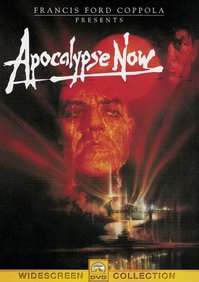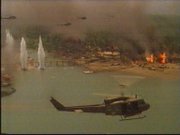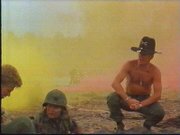Apocalypse Now
Apocalypse Now is a 1979 American film directed by Francis Ford Coppola from a script by John Milius (rewritten by Coppola) which was inspired by Joseph Conrad's classic novella Heart of Darkness. more...
Set during the Vietnam War, a taciturn American soldier is sent to "terminate with extreme prejudice" the command of a rogue United States Army Special Forces colonel. The narrative of his journey and its culmination are studded with events which, while bizarre, are based on real Vietnam stories. The soldier's journey becomes increasingly nonlinear and hallucinatory. Coppola's agenda clearly involves larger themes; the film's subtext concerns a journey into the darkness of the human psyche.
The film features performances by Martin Sheen as Captain Benjamin L. Willard (Marlow in Conrad's novel), Marlon Brando as Colonel Walter E. Kurtz, Dennis Hopper as a fast-talking hallucinogen-using photojournalist, and Robert Duvall in an Oscar-nominated turn as the borderline-psychotic Lt. Colonel Kilgore. Several other actors who were (or later became) prominent stars had minor or supporting roles in the movie including Harrison Ford, R. Lee Ermey and Laurence Fishburne (who, only fourteen years old when shooting began in March 1976, was credited as 'Larry Fishburne').
The movie poster art for Apocalypse Now is one of the more famous paintings by Bob Peak, who is considered an influential artist in the world of film when it comes to movie posters.
Background
Filmed in the Philippines (most notably the Pagsanjan River and Hidden Valley Springs), the film went far over budget and schedule: a typhoon destroyed many of the sets, the Philippine Army helicopters used for shooting were constantly called back by President Ferdinand Marcos to be used in actual combat, the lead role was recast (Martin Sheen replaced Harvey Keitel after shooting had begun), Sheen then had a near-fatal heart attack, Brando was intractable and out of shape, and Coppola himself was mentally fragile. Being similar in appearance and remarkably similar in voice, Joe Estevez stood in for the unwell Sheen in much of the film and some of the narration is by him.
After the first edit, the film was six hours long and had to be severely edited; the original released version was just over two and a half hours long. (Coppola re-released the film in 2001 under the title Apocalypse Now Redux, restoring footage and sequences and lifting the running time to 200 minutes.) For background information on the film, see Eleanor Coppola's documentary, Hearts of Darkness: A Filmmaker's Apocalypse, released in 1991.
Synopsis
U.S. Army Captain Benjamin L. Willard is stationed in Saigon; a seasoned veteran, he is deeply troubled and apparently no longer fit for civilian life. A group of intelligence officers approach him with a special mission up-river into the remote Cambodian jungle to find Colonel Walter E. Kurtz, a former member of the United States Army Special Forces.
They state that Kurtz, once considered a model officer and future general, has apparently gone insane and is commanding a legion of his own Montagnard troops deep in neutral Cambodia. Their claims are supported by very disturbing radio broadcasts and/or recordings made by Kurtz himself. Willard is asked to undertake a mission to find Kurtz and dispose of him "with extreme prejudice."
Willard studies the intelligence files during the boat ride to the river entrance and learns that Kurtz, isolated in his compound, has assumed the role of a warlord and is worshipped by the natives and his own loyal men. Another officer, sent earlier to kill Kurtz, has apparently become one of his lieutenants.
Willard will begin his trip up the Nung river on a PBR (Patrol Boat, River), with an eclectic crew composed of by-the-book and formal Chief Phillips, a black Navy boat commander; GM3 Lance B. Johnson, a tanned all-American California surfer; GM3 Tyrone, AKA "Clean", a black 17-year-old from The Bronx; and the Cajun Engineman, Jay "Chef" Hicks.
The PBR arrives at a Landing Zone where Willard and the crew meet up with Lt. Colonel Bill Kilgore, the merciless commander of the AirCav in the region, following a massive and hectic mopping-up operation of a conquered enemy town. Kilgore, a keen surfer, befriends Johnson. Later, he learns from one of his men that the beach down the coast which marks the opening to the river is perfect for surfing, a factor which persuades him to capture it. The problem is, his troops say, it's "Charlie's point" and heavily fortified. Dismissing this complaint with the explanation that "Charlie don't surf!", Kilgore orders his men to saddle up in the morning so that the AirCav can capture the town and the beach. Riding high above the coast in a fleet of Hueys accompanied by H-6s, Kilgore launches an attack on the beach. The scene, famous for its use of Richard Wagner's epic "Ride of the Valkyries", ends with the soldiers surfing the barely claimed beach amidst skirmishes with infantry and VC. After helicopters swoop over the village and demolish all visible signs of resistance, a giant napalm strike in the nearby jungle dramatically marks the climax of the battle. "I love the smell of napalm in the morning; smells like...victory," Kilgore exults to Willard. The quote made it to #12 onto the American Film Institute's AFI's 100 Years... 100 Movie Quotes, a list of top movie quotes.
Read more at Wikipedia.org




